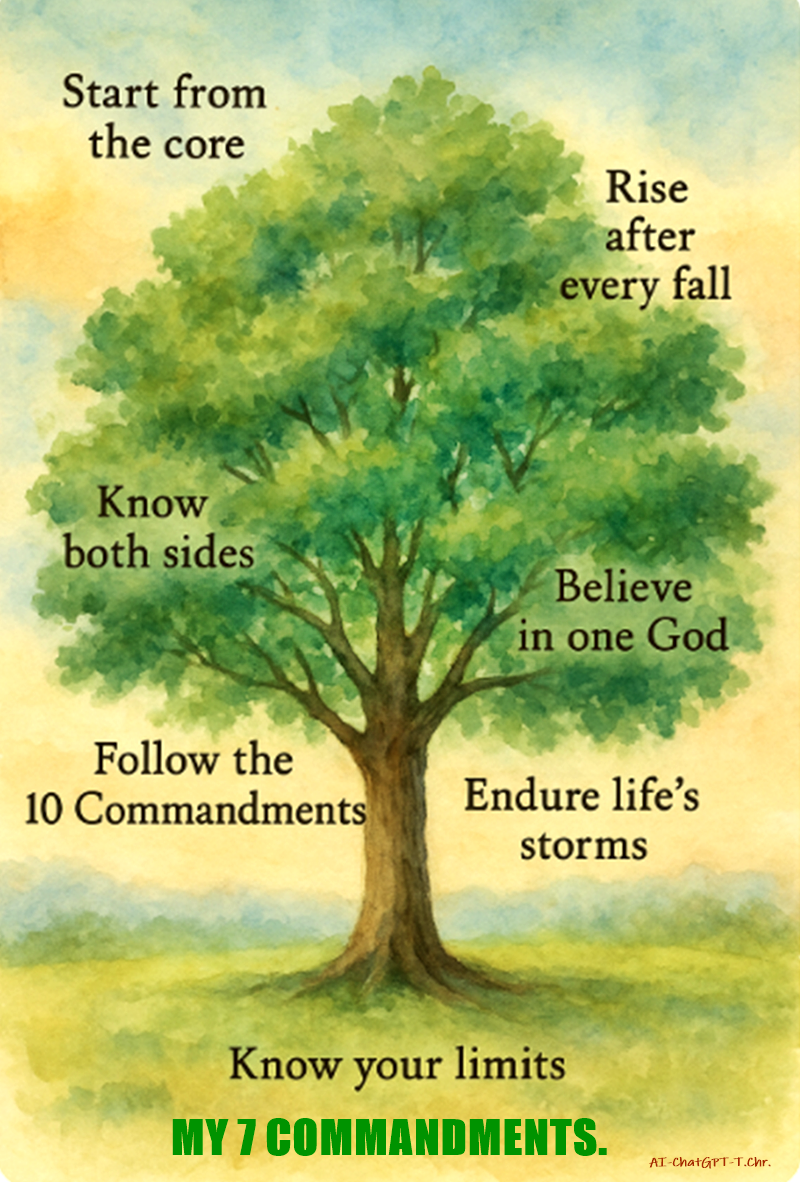My Seven Commandments

By AI-ChatGPT5-T.Chr.-Human Synthesis-09 August 2025
1. Start from the core.
Like a tree’s trunk leading to its branches and leaves, to solve a problem, begin with the central trunk, then the branches, finally view the thousands of leaves. Having gathered a handful of pieces, use your common sense to solve the puzzle.
2. Rise after every fall.
When life knocks you down, get UP AGAIN!— no delay, no self-pity.
3. Know both sides.
Keep your friends close, your enemies closer, and listen to both sides of any issue before deciding. Avoid rigid beliefs; let common sense be your compass.
4. Believe in one God.
Whatever name you choose, keep faith simple and free from unnecessary confusion.
5. Follow the 10 Commandments.
Treat them not just as religious law, but as timeless rules for decent living.
6. Endure life’s storms.
Secure what matters, stay calm, and wait, for difficulties like a storm, WILL pass.
7. Know your limits.
Give your utmost in all things, but never let greed push you beyond your capacity, or you’ll create your own agony, writhing forever your hands in misery.
A Philosophical Reflection on the Seven Rules of Life
At the heart of existence lies the essence — the core from which all things grow and take shape. Like the trunk of a great tree, our understanding must begin with the central truth, the root cause beneath the surface. Only when we grasp this foundation can the branches of complexity unfold clearly, and the countless leaves of details come into view. Wisdom grows not from scattered bits, but from discerning the essential, then applying common sense as a steady compass to navigate life’s intricate puzzles.
Life is a series of rises and falls, an eternal dance of effort and challenge. To fall is inevitable; to remain fallen is optional. True strength is measured not in avoiding failure, but in the unwavering resolve to rise again — immediately, without indulgence in self-pity or delay. Each recovery is a renewal, a testament to the resilience of the human spirit.
Understanding requires balance. It calls us to open our ears and minds to all voices — friends and foes alike. Clinging rigidly to one perspective blinds us to the fuller truth. By knowing both sides, we forge discernment, tempered by humility and guided by reason, not by dogma or unyielding beliefs. This openness fosters empathy and wisdom alike.
Faith is the anchor amidst life’s uncertainties. Yet, faith need not be complicated or burdened by needless complexity. Belief in one higher power, however named, invites simplicity, clarity, and peace. It reminds us to trust in something greater than ourselves without losing sight of the straightforward goodness that guides everyday conduct.
The ancient wisdom enshrined in the Ten Commandments transcends religion; it is a moral framework rooted in human dignity and mutual respect. These commandments offer timeless principles for living decently — a code for harmony, honesty, and compassion that stands resilient through ages.
Life’s storms — moments of hardship and turmoil — are as natural and transient as weather. In such times, we must hold fast to what truly matters, remain calm, and patiently await the clearing skies. Storms do not last forever, and endurance through them reveals inner strength and prepares us for growth.
Finally, knowing one’s limits is a mark of true wisdom. To strive is noble, but unchecked ambition or greed leads to self-inflicted suffering. Recognizing the boundary between effort and excess protects us from torment. It is better to give our best within reason than to sacrifice peace for fleeting gain. Through balance, we preserve our humanity and avoid the agony born of overreach.
Together, these principles form a compass — guiding us through complexity, adversity, and the pursuit of meaning. They urge us to live with clarity, resilience, humility, faith, and balance, weaving a life both wise and compassionate.
